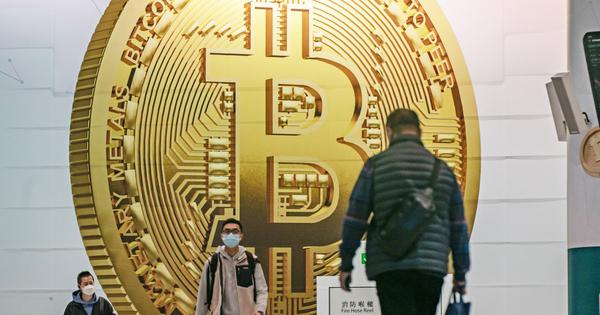The cryptocurrency bitcoin, which saw stunning gains last year, lost more than half its value over the past six months.
Since ratcheting up to more than $64,000 in November, the price of one bitcoin has now fallen more than 50 percent. On Friday it was trading around $30,000, after falling as low as $26,000 earlier in the week.
The sell-off is tied in part to rising interest rates and inflation that sits at 40-year highs, which has sent the broader stock market reeling. But the extent of bitcoin's decline may come as a shock — especially to some investors who bought bitcoin during its most recent price run-up.
A host of online narratives, some of which have been echoed in mainstream business publications, had proclaimed bitcoin to be untethered to the traditional investment markets, and even to be a trustworthy hedge against the kind of inflation the U.S. and other parts of the world are now experiencing.
But this week's bitcoin sell-off came amid a wider market downturn — something that appears to disprove the notion that bitcoin is walled-off from conventional market pressures, analysts say.
"That was a narrative, but it's not true," said Damanick Dantes, an investor and a crypto market analyst at the cryptocurrency website CoinDesk.
Instead, Dantes said, bitcoin's price trajectory looks more like those of volatile technology stocks for companies that often operate at losses despite high growth.
In other words, betting on bitcoin these days is no different than betting on a tech company that could have lots of potential, but whose short-term value is no longer clear.
Growth in those assets, Dantes said, is usually fueled by what he called investors' excess risk budgets — which are often correlated with low interest rate environments. Given that interest rates have risen and investors' appetite for risk is waning, he said, bitcoin's sell-off is not surprising.
"Investors and traders are now looking for stability, for high-quality value areas," he said. "That's the complete opposite of an asset like bitcoin."
Risk asset
The price of bitcoin soared amid the pandemic, rising from about $10,000 in September 2020 to more than $60,000 in March 2021. The surge was driven in part by headlines that indicated increased buying by ever-larger companies, including Tesla, which in February 2021 announced it had purchased $1.5 billion in bitcoin.

Yet by July 2021, bitcoin had plunged in price to about $31,000. The drop followed a May announcement that China had banned its financial and payment institutions from providing cryptocurrency services. By September, China had issued a blanket ban on all crypto transactions and mining in the country.
Soon after, bitcoin began to rise again. The year 2021 also saw the rise of the so-called "meme" stocks like GameStop and AMC. Analysts say the price of bitcoin is now most heavily correlated with those types of high-risk, high-reward equities. GameStop shares hit a high of $325 in January 2021, and have fallen about 70 percent to $98 at the close of markets on Friday. AMC, meanwhile, has fallen about 80 percent from $59 in June 2021 to $11 on Friday.
"It's the same traders — the same investors," said Don Kaufman, co-founder of trading education platform TheoTrade and a trading professional. "It's bitcoin, NASDAQ, meme stocks."
Warnings to exercise caution
For many investors, bitcoin's stunning 2021 run-up was too much to resist.
According to a survey released in December by the crypto firm Grayscale Investments LLC, more than half of then-current investors had bought into bitcoin only in the past 12 months. The survey was first reported by Bloomberg.
In a sign of how widespread bitcoin's adoption had become, the financial services group Fidelity announced in April it would begin giving retirement managers the ability to invest workers' retirement savings in bitcoin.
The announcement came despite guidance issued in March by the U.S. Department of Labor warning retirement plan managers to "exercise extreme care before they consider adding a cryptocurrency option to a 401(k) plan's investment menu for plan participants."
In an interview with NBC News, Ali Khawar, Assistant Secretary for the U.S. Department of Labor, said that caution still stands.
"We've been seeing a lot out there saying, 'This is next sure thing' — with an element of 'Get in on the ground floor or you're going to regret it,'" Khawar said. "What you don't often hear is the other side of the equation: That this is a relatively young asset class, with a lot of difficult questions not going answered, like how it's being valued, or how it's being stored."
The future outlook
But if bitcoin is not a sure thing when it comes to immediate returns on investment, many investors still believe it to be the next big thing for tech, said Ed Moya, senior market analyst with foreign exchange group OANDA. He compared the recent cryptocurrency sell-off to the dot-com bubble burst. While both may have been necessary to eliminate "froth" in their respective markets, the underlying technologies remain viable, he said.
"Bitcoin is providing investors exposure to the future of blockchain technology and the future of smart contracts," Moya said. "And for a lot of emerging markets that are struggling with their fiat currencies, it's also posing an alternative option for investors."
While it is now clear that bitcoin is not an inflation hedge or safe haven asset, he said, "For a lot of people, it will provide a long-term value. Its ecosystem will provide the next wave of innovation."
But exactly when the bets on that ecosystem will pay off is now an open question. In the meantime, bitcoin holders — especially those newer to the market — are taking heavy losses. According to data reported by Bloomberg, short-term bitcoin holders bought into the digital currency at an average price of $47,500 — meaning they are now firmly in the red.
The notion that bitcoin should be considered a risk asset correlated with some of the edgier names in tech was echoed this week by Coinbase, one of the largest cryptocurrency brokerages. Coinbase has seen its shares plummet almost 80 percent from a high of $323 in November 2021 to about $68 — including an approximately 20-percent drop Wednesday.
"We're seeing a down market for growth tech stocks and risk assets," said Coinbase CEO Brian Armstrong during the company's most recent earnings call. "And of course, Coinbase and crypto is no exception to that."
And like those more volatile tech stocks, bitcoin is proving highly sensitive to interest rates. When money is more expensive to borrow, investors are less likely to invest in riskier bets on the future like bitcoin. So, as interest rates rise, bitcoin's price is more likely to fall.
Dantes of CoinDesk said bitcoin prices also fell in 2014 and 2018 amid a less accommodative monetary stance from the Federal Reserve.
"We're now in a moment of high inflation and tightening monetary policy, so we expect lower returns for all assets going forward," he said. "And if we're lower returns on traditional assets, we're going to see extremely low returns for speculative assets."




